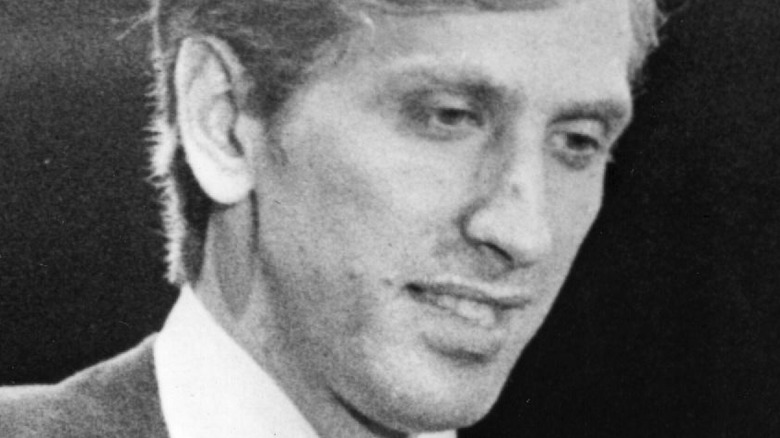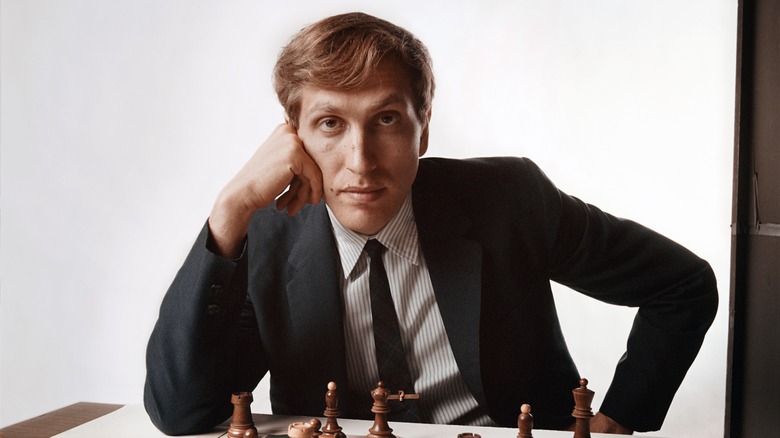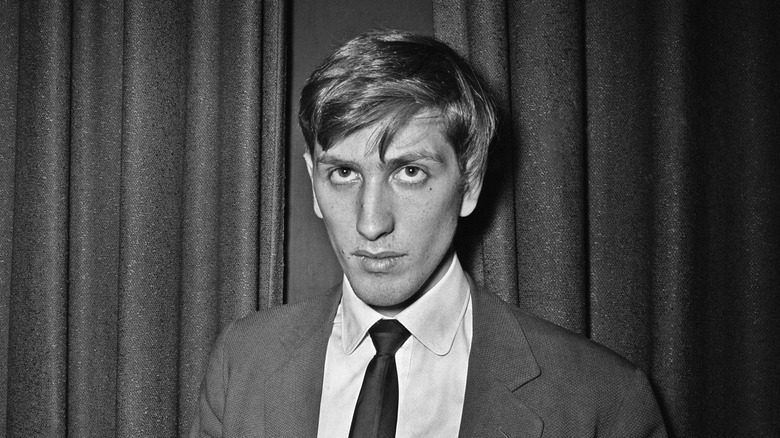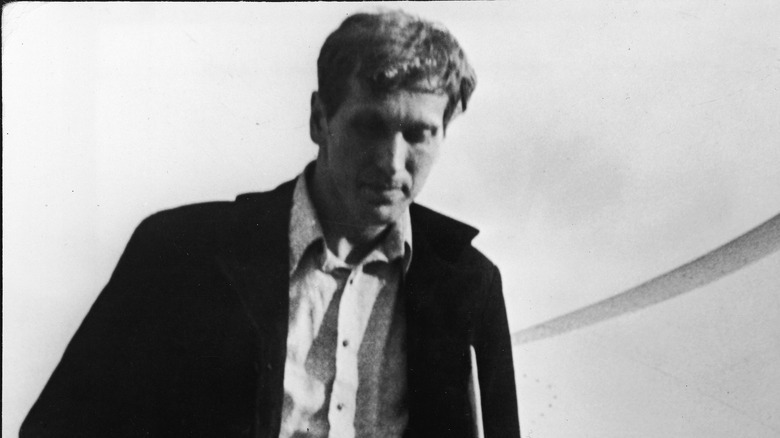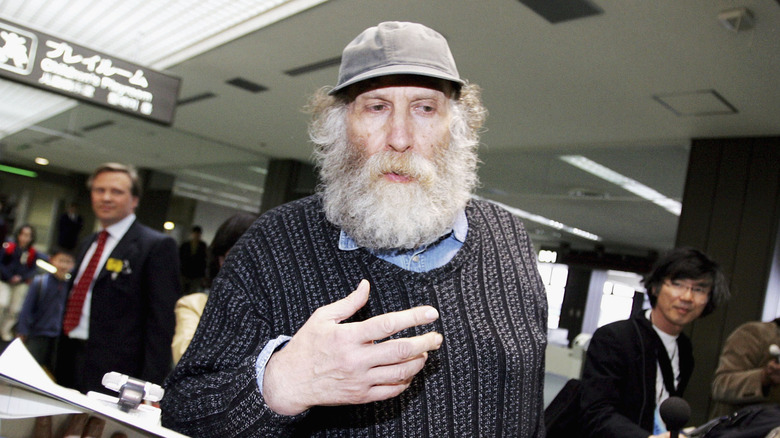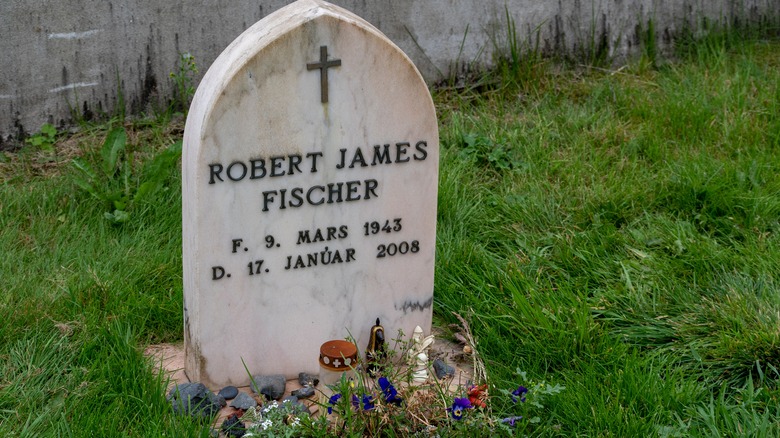Here's Who Inherited Bobby Fischer's Money After He Died
Name the most famous American chess player to ever live. Heck, name any American chess player (and Beth Harmon doesn't count because she's fictional). If your mind went to Bobby Fischer, then congratulations, you've named the man who put American chess on the map, possibly at a time when he was needed the most.
A chess prodigy, Fischer dominated as a teen and won the first of his eight United States championships at the age of 15, according to Britannica. Then in 1972, he did the unthinkable: he beat Soviet champion Boris Spassky. The televised event — at a time when televising a chess match was unprecedented in the U.S. — was something of a metaphor for the Cold War, and in this case, the Americans won.
Unfortunately for Fischer, his personal demons were never far from the surface, and his career and life were marked by unbridled hostility towards his opponents, provocative and outrageous statements, strange behavior, and decades-long disappearances. He died in exile in 2008, facing criminal charges in his home country and having alienated just about everyone. And he left a modest estate that an Icelandic court was forced to sort out.
Bobby's world
Bobby Fischer was born in Chicago in 1943, and by the age of 6, he had learned the moves of chess (per Britannica). In 1956, at the age of 13, Fischer started making waves in the chess world when he defeated an International Master — and a considerably older man — with a devastating Queen sacrifice. A few years later, he was the U.S. champion; a few years after that, he was the world champion.
In the background of Fischer's career and life was the Cold War. The U.S. and the Soviets were at odds ideologically and had nuclear weapons pointed at each other. As such, when the American Fischer squared off against the Soviet Boris Spassky for the world championship, it was more than just a chess match — it was something of a metaphor for the Cold War (via BBC News).
Spassky, for his part, didn't embrace the whole chess-as-metaphor concept. According to Chess24, he just wanted to play. Further still, despite Fischer's hostility and his later degeneration into self-destruction, Spassky was still fond of his American adversary. "I've kept good memories of Fischer. I don't have any grudges against him. I always forgave him the fact that he behaved like a child," he said, per Chess24.
Searching for Bobby Fischer
In 1975, Bobby Fischer refused to defend his world championship and was subsequently stripped of his title (per The New York Times). It was at this point that he effectively disappeared for two decades.
Between 1975 and 1992, Fischer was not only out of the public eye, he was just ... gone. But for the occasional radio interview, during which he would make outrageous and provocative statements (about the U.S., about Jews, about whatever else was on his mind). For the better part of two decades, he was basically the Bigfoot of chess: No one knew for certain where he was, although unverified reports of his whereabouts would make their way into the chess community as rumor. In fact, Fischer spent at least some of those years in L.A. and/or Pasadena, either couch-surfing or, by some accounts, homeless.
Fischer emerged in 1992 for a rematch against Boris Spassky, which he won, and then disappeared again. His public profile increased during his second disappearance, as he kept making the news for breaking the law. His match against Spassky, for example, took place in what was then Yugoslavia, and Fischer was charged in the U.S. for violating sanctions against the country. He was also arrested for trying to fly out of Tokyo on a revoked passport, and he continued to make provocative statements whenever there was a microphone nearby.
His money
These days, anyone with internet access can (theoretically anyway) make money playing chess. All you need is a Twitch stream (or a YouTube channel), a few thousand followers, maybe some sponsors, and you're making money. However, a few decades ago, the number of people who made a decent living playing chess could probably have been expressed in three digits. Fischer was, of course, one of them.
It's not clear how much money Bobby Fischer made in his day, but it was a lot — at least for a pre-Twitch chess player. When he won the world championship in 1972, he was paid just over $150,000 – a good amount of money under the Nixon administration, particularly for chess (via History). When Fischer faced Boris Spassky again in 1992, the prize pool had gone up to $5 million, according to The New York Times. During his years in seclusion, Fischer was offered other opportunities to earn bank, such as from the Shah of Iran for a match in his country or from the then-dictator of the Philippines, Ferdinand Marcos, for a match in his country, all of which he turned down.
When he died in 2007, according to The New York Post, his estate was estimated to be worth about $2 million.
His family
When Bobby Fischer died in 2007, he left no will (via The New York Post). Since he'd been living in Iceland for a few years by that time — the small island nation having offered him asylum after he ran afoul of U.S. authorities — it was up to a Reykjavik court to sort out his estate. Unfortunately, it was far from straightforward, thanks largely due to his secretive nature, complicated by his decades spent in obscurity, possibly some of it in homelessness.
Fischer's only living relatives at the time were two nephews, the sons of his only sibling — a sister who, like his mother, had preceded him in death. A Filipino woman, Marilyn Young, claimed that Fischer had fathered a daughter with her, but a DNA test later confirmed that he was not the young lady's father, according to BBC News. A Japanese Chess Federation official, Miyoko Watai, presented the court with a marriage certificate, and Watai claimed that she and Fischer were wed in 2004, while Fischer was jailed in Tokyo over a passport dispute.
It would take the court a couple more years to finally sort everything out.
Fischer's widow inherited his estate
In March 2011, a Reykjavik judge made the final ruling in the complicated and contentious matter of Bobby Fischer's estate (per The Sydney Morning Herald). Claims of paternity of a young girl having been settled, all that was left was the claim of Fischer's nephews, who insisted that his marriage to Miyoko Watai was either illegal or nonexistent. However, the Reykjavik District Court ruled the marriage legal, and that meant that Fischer's widow would inherit his money. Further still, the court ruled that Fischer's nephews would be on the hook for approximately $57,520 in legal costs to Watai, according to Reuters.
Chess has come a long way since Fischer's career and even since his death. You can thank the growth of live-streaming chess on the internet for part of that, but even that might not be as big of a thing as it is today without the COVID-19 pandemic renewing interest in chess, as well as the hugely popular chess series "The Queen's Gambit" on Netflix.
Meanwhile, U.S. and world chess champions of late have been decorous and circumspect men who, unlike Fischer, don't make outrageous statements or demands. For example, U.S. Champion Wesley So talks mostly about chess when he gives interviews, and world champion Magnus Carlsen is less confrontational and combative.
